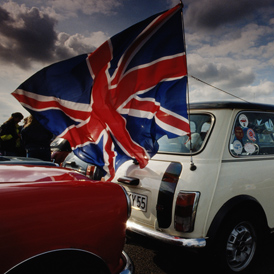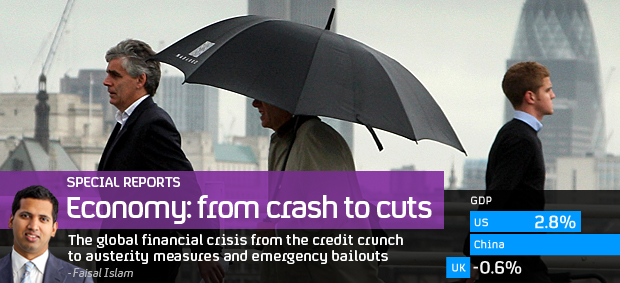Can manufacturing save the British economy?
The government says economic growth will come from rebalancing the British economy in favour of manufacturing. But what does Britain still make? Business Correspondent Sarah Smith investigates.
I’ve recently moved back to the UK from Washington DC. Packing all my worldly goods into cardboard boxes raised some interesting questions. How much of the stuff I was lugging into my new house was made in Britain? And if I wanted to, could I fill this new home entirely with things that were manufactured here?
The government tell us economic growth will come from rebalancing the British economy in favour of manufacturing. So I wanted to find out what we do still make here, what we don’t make anymore and what we could be making more of.
I have found out you can’t buy a British kettle anywhere. And we tracked down sad shaky mobile phone footage of the last ever British TV rolling off the production line a couple of years ago. Even the new teasmades you can buy in the shops these days were made in China.
As I started unpacking my own stuff I was a little shocked to notice how much was “Made in China”, “Made in Thailand”, and “Made in France”. Hardly anything I own seemed to have a “Made in Britain” sticker.
I was a little shocked to notice how much was ‘Made in China’, ‘Made in Thailand’, and ‘Made in France’. Hardly anything I own seemed to have a ‘Made in Britain’ sticker.
What is ‘Made in Britain’?
I was pretty sure my Portmeirion crockery must have been made in Britain – in Wales, I thought. But when I get to Portmeirion and the factory in Stoke in Trent, I find out it was in fact made in China.
The company does make about half its output in Stoke. They say the “Made in England” sticker they put on the bottom of those goods is a real selling point in Korea – their biggest customers. They do all the intricate hand painting of the famous Blue Spode china in Stoke, and say you could never get that quality of work in China. But many of their bestselling lines are made in China and they say there is no way they could ever afford to invest in the machinery in the UK they need to make the Sophie Conran range I have at home.
It’s no real surprise that a lot of the goods we all buy are made overseas. The things that Britain is best at making are not the kind of things you and I get in the shops. I’m never going to buy an aeroplane engine – but if I did need one I would be well advised to buy British. We lead the world in aerospace engineering. Just not in kettles, TVs or teasmades.

I did manage to track down a small toaster manufacturer. He actually sells toasters to China because he says that although many Chinese companies have tried to copy his designs, they can never achieve the lasting quality of goods made in Britain. This is exactly the kind of company whose expansion is supposed to be driving our economy back to growth.
Recession pain
However his business has suffered a lot in recession. He has laid off staff. And like so many small and medium sized businesses he has struggled to get a bank loan.
“Banks will only lend you an umbrella on a sunny day,” he says.
Every company that I visited told me very similar things about what help they needed to grow into a larger part of the UK economy. Anyone who makes consumer goods had problems with VAT at 20 per cent.
Most companies said that they find the red tape that is wrapped round British employment laws almost impenetrable and a real disincentive to hiring more staff. Many have had trouble getting bank loans. And they felt the constant flow of depressing economic news was dampening consumer confidence to a point where people are scared to spend money.
On the bright side – when people are spending money they seem keen to deliberately spend it on British-made goods. All kinds of companies are stamping Union Jacks on their products to make very clear that there were made here. John Lewis also detects a patriotic desire to buy British these days so they are about to introduce a new Union Jack symbol on all their British-made goods.
Shame the Union Jack sofa proudly displayed in their Oxford Street store was made in China!
